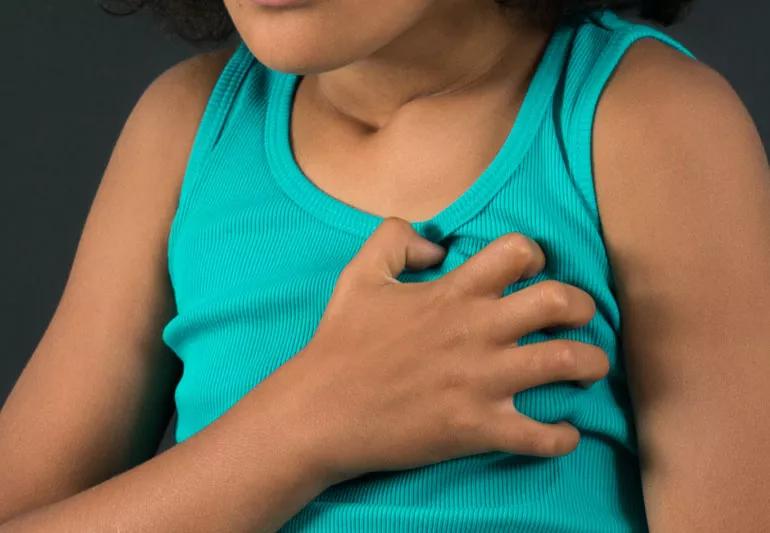Most chest pain in kids isn’t worrisome, but there are some symptoms that deserve attention

Your child approaches you with a hand on their chest directly over their heart. The look on their face says that something is very, very wrong. “It hurts,” they say between painful gasps. “It hurts a lot.”
Advertisement
Cleveland Clinic is a non-profit academic medical center. Advertising on our site helps support our mission. We do not endorse non-Cleveland Clinic products or services. Policy
Moments don’t get more terrifying for parents. But here’s something to put your heart at ease: Chest pain in children is typically NOT a sign of a serious health condition — and rarely does it have anything to do with their heart or lungs.
So, what’s probably causing that scary chest pain? Let’s get some answers from pediatric cardiologist Kenneth Zahka, MD.
Let’s start with an uncomfortable reality. Chest pain in children can be stunning in its intensity. Kids may describe a stabbing pain — and it’s frequently felt on the left side of their chest over their heart.
This unexplained pain is often diagnosed as precordial catch syndrome, or PCS. (It’s also known as Texidor’s twinge, with the name referencing one of the physicians who first identified the syndrome in 1955.)
Aside from intensity and location, other common symptoms of PCS include chest pain:
Now the good news: The most harm PCS typically does is cause worry. “It isn’t dangerous or life-threatening and usually resolves by adulthood,” states Dr. Zahka.
Advertisement
What causes PCS in children isn’t known for sure, but some believe the pain involves a compressed nerve or muscle cramp, says Dr. Zahka.
What’s agreed upon, though, is that the chest pain is not due to a heart issue.
What can you do about PCS if it suddenly appears in your child? Basically, wait it out. Remember, the pain usually only lasts for a few minutes before vanishing.
If the pain recurs, you may want to try an anti-inflammatory medicine like ibuprofen.
PCS is just one explanation for chest pain in children. That hurt also could be due to:
Pain from either of the above typically fades within a few days of rest and staying away from activities that aggravate the pain. Taking over-the-counter pain relievers can help reduce any discomfort.
Concerning pain related to the heart typically radiates out from within the chest, clarifies Dr. Zahka. Indications that chest pain in children may involve a more serious issue include pain that’s:
Bottom line? When in doubt, get chest pain checked out.
“It’s never wrong to consult a healthcare professional if you are worried about your child’s chest pain symptoms or heart health,” reassures Dr. Zahka. “A pediatrician or pediatric cardiologist can help get to the bottom of it.”
Advertisement
Learn more about our editorial process.
Advertisement

With straightforward explanations, this doesn’t need to be an uncomfortable conversation

There’s no way to stop a heart attack on your own — call for help immediately

Babies are born with very little of this vitamin, which plays a critical role in the blood clotting process

The emergency room is for serious medical issues; urgent care can help when you can’t get a quick appointment with your child’s doctor

Gripe water isn’t regulated by the FDA, and research doesn’t support its use

From heartburn and panic attacks to muscle spasms and heart attacks, lots of medical conditions can cause chest pain

Lice don’t jump — but they can spread with direct head contact

Some warts will clear up on their own, but others may need home remedies or medical care

Wearing a scarf, adjusting your outdoor activities and following your asthma treatment plan can help limit breathing problems

Your diet in the weeks, days and hours ahead of your race can power you to the finish line

When someone guilt trips you, they’re using emotionally manipulative behavior to try to get you to act a certain way